China Hainan Coffee Beans Librika Coffee Beans
Liberica coffee beans: large shrubs or small trees, 6-15 m tall; dark brown bark; branches spreading, hard and straight. Leaves opposite, leathery, elliptic or Obovate-elliptic, 15-30 cm long, apex mucronate, base broadly cuneate, margin entire, rarely microwave, often with small pores in lower vein axils; petiole 8-20 mm long; stipules broadly triangular, 3-4 mm long, tip obtuse, rarely convex. Cymes 2 to several clustered leaf axils or leaf scars of old branches, with very short involucral pedicels; bracts connate at base, usually 2 broadly ovate, apex truncate, other 2 striate or leaflike; calyx eaves parted or lobed; Corolla white, 2.5-3.2 cm long, distally enlarged, lobes 6-11, elliptic moment rounded, 16 mm long. Berries broadly oval, 19-21 mm long. Native to Africa, western Liberia; introduced and planted in Hainan and Yunnan. The use is the same as ordinary coffee.
The coffee below is produced in Hainan:
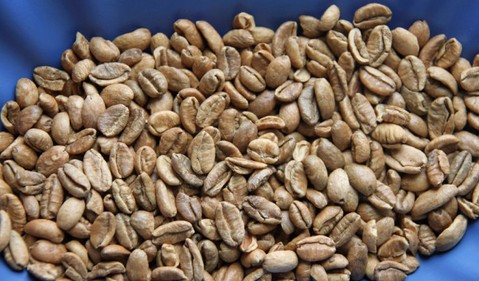
A hodgepodge of coffee and raw beans smells stinky!
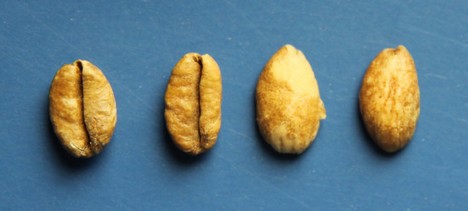
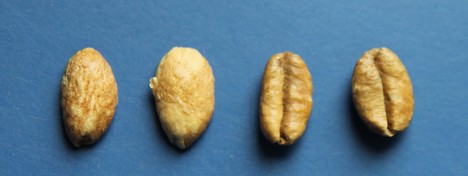
Photo of Liberica coffee beans
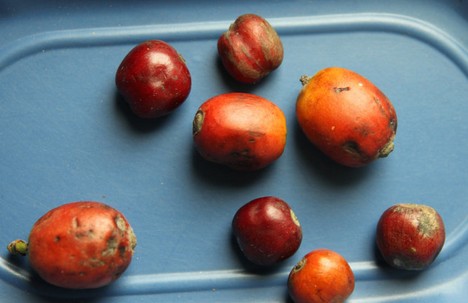
The coffee fruit has been here for a long time. The fruit is a little bad.
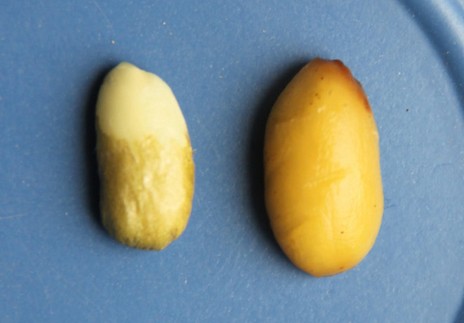
One is the broken raw bean, the other is with endocarp.
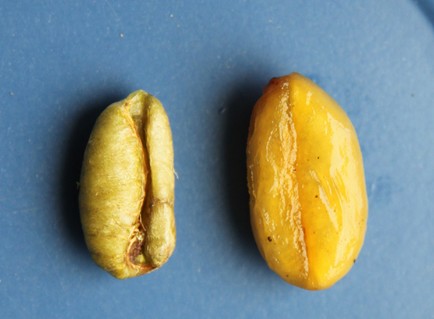
Important Notice :
前街咖啡 FrontStreet Coffee has moved to new addredd:
FrontStreet Coffee Address: 315,Donghua East Road,GuangZhou
Tel:020 38364473
- Prev

Boutique Coffee introduction Maui Moka (Maui Mokka)
There are two sources of Maui Mokka coffee varieties: one is the sudden mutation of the bourbon variety from the old bourbon island, and the other is the mocha variety transplanted in Yemen. The coffee tree is not tall, the leaves are small and slender, and the raw beans are small and orchard; it is easy to get rust spot and the yield is very low. Except for Maui, Hawaii, there is a small amount of cultivation in Brazil, although it is grown at a lower altitude.
- Next

10 essential elements of boutique coffee beans
Fine coffee beans: must be at least 90% bourbon, Pacamara or Maragogipe coffee 1. Must be at least 90% bourbon, Pacamara or Maragogipe coffee 2. 100% fully matured to red wine color 3. Manufacturing process is separate from other coffees, avoiding
Related
- Beginners will see the "Coffee pull flower" guide!
- What is the difference between ice blog purified milk and ordinary milk coffee?
- Why is the Philippines the largest producer of crops in Liberia?
- For coffee extraction, should the fine powder be retained?
- How does extracted espresso fill pressed powder? How much strength does it take to press the powder?
- How to make jasmine cold extract coffee? Is the jasmine + latte good?
- Will this little toy really make the coffee taste better? How does Lily Drip affect coffee extraction?
- Will the action of slapping the filter cup also affect coffee extraction?
- What's the difference between powder-to-water ratio and powder-to-liquid ratio?
- What is the Ethiopian local species? What does it have to do with Heirloom native species?

